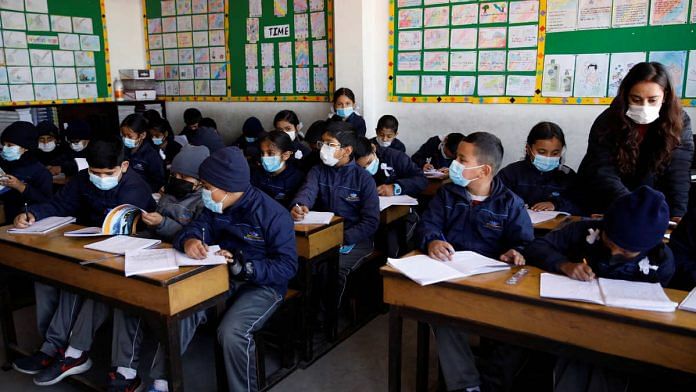New Delhi: Supporting Prime Minister Narendra Modi’s call for an ‘Aatmanirbhar Bharat’ (self-reliant India), a body called Shiksha Sanskriti Utthan Nyas (SSUN), an affiliate of the Rashtriya Swayamsevak Sangh (RSS), has suggested that the use of ‘swadeshi’ products such as uniforms and food items be made mandatory in all educational institutions.
Speaking to ThePrint, SSUN head Atul Kothari said if crores of school students in India start wearing khadi uniforms, for example, it would be great for India’s industry and economy, as would serving Indian cuisine only at their canteens.
For this, the SSUN has submitted memorandums to the Prime Minister’s Office (PMO) and the Ministry of Human Resource Development, and said if it’s not possible to make ‘swadeshi’ mandatory in all institutions, at least it should be implemented in government-run schools.
According to information provided to ThePrint by an HRD official, there are 645 Jawahar Navodaya Vidyalayas with 2,74,916 enrolled students; 1,235 Kendriya Vidyalayas with 13,15,708 students; and over 23,000 CBSE-affiliated schools with over two crore students. The SSUN says these numbers are promising for the prospect of an ‘Aatmanirbhar Bharat’.
“This will only be possible with ‘swadeshi’. All the freedom fighters, including Gandhiji, had advocated ‘swadeshi’. This will lead to job creation in our country and our money will stay here,” Kothari said.
Also read: How Modi govt’s push for self-reliance is inspired by RSS model of swadeshi economics
National Education Policy
The SSUN is also concerned about the fact that all educational institutions have had to be closed for the last two months due to the Covid-19 pandemic, at a time when the National Education Policy is supposed to be finalised. Therefore, it has also suggested some changes to the NEP, bearing in mind the changing world scenario due to the pandemic.
Terming the novel coronavirus as “Cheeni corona vishanu” (Chinese corona virus), the SSUN has suggested that online education needs to be given the utmost importance in the NEP, and also pressed for focus on skill-based education.
One of its major suggestions is to include the “importance of a self-reliant economy” in the syllabus.
India can be a powerful exporter of goods
Kothari said self-reliance would make India a powerful exporter of goods, like China. “Once self-reliant, we will be in a position to export like China. However, China does it for its imperialist expansion; we will do it to help the world. Imperialism has never been in our nature,” he said.
He also advocated self-reliance to other countries, though he did say every country is not in a position to achieve it, which is where India can become an important destination for their needs.
He cited the example of the drug hydroxychloroquine, which India is exporting to countries including the US.
Since PM Modi announced the ‘Aatmanirbhar Bharat Abhiyan’ in his address to the nation last week, there have been glimpses of the push for self-reliance in subsequent government announcements.
Finance Minister Nirmala Sitharaman has cited examples like the manufacture of personal protective equipment during the Covid-19 crisis, which never happened in India earlier, to show the country’s move towards self-reliance. The Union home ministry, meanwhile, has decided that the canteens of BSF, CRPF and other central police forces will sell only ‘swadeshi’ goods.
Also read: Vocal for local: Can India afford self-reliance or is it a slogan to please swadeshi lobby?



